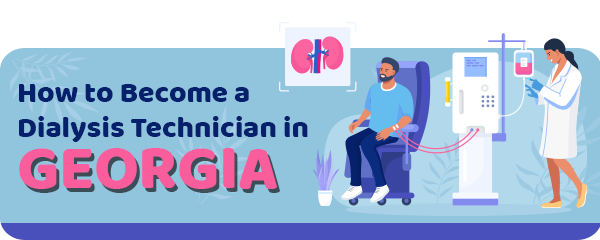
Without dialysis machines and skilled operators, the lives of many people could be significantly shortened.
This underscores the vital role of dialysis technicians in the healthcare industry.
While the operation of dialysis machines may not seem glamorous, it offers a fulfilling career for those who have a genuine desire to assist others.
If you’re interested in learning more about this profession, you’re in the right place, so read on!
Article Table of Contents
Dialysis Technician Job Description in Georgia
Before committing to a profession, it’s crucial to understand the scope of your responsibilities.
Dialysis technicians in Georgia primarily work with patients experiencing kidney issues.
Their core duty involves ensuring the proper functioning of dialysis machines and adjusting them to meet individual patient requirements.
Here are some additional tasks they perform:
- Monitoring the vital signs of patients
- Assisting patients throughout the dialysis procedure
- Ensuring patients are safe and comfortable
- Administering oxygen if deemed necessary
- Performing Basic Cardiopulmonary Resuscitation (CPR) if the situation demands it
- Reviewing a patient’s medical history to identify any concurrent conditions requiring attention during the procedure
- Making adjustments to the dialysis machines as necessary to accommodate each patient’s needs
These represent some of the common responsibilities of a dialysis technician, but day-to-day tasks may vary.
Dialysis Technician Requirements in Georgia
In Georgia, individuals pursuing a career as dialysis technicians fall under the jurisdiction of the private sector.
The state of Georgia does not impose strict training and certification requirements for dialysis technicians.
Instead, these professionals must adhere to guidelines established by the Centers for Medicare and Medicaid Services (CMS).
The CMS outlines the following prerequisites for aspiring dialysis technicians:
- Possession of a high school diploma or GED
- Completion of a training program
- Credentialing
- Adherence to Competency Standards of Practice
- Licensure or certification
Certification must be obtained within 18 months of starting employment.
Prospective technicians can pursue national-level certifications through examinations administered by organizations such as:
- The Nephrology Nursing Certification Commission (NNCC)
- Certified Clinical Hemodialysis Technician (CCHT) Exam
- The Board of Nephrology Examiners Nursing and Technology (BONENT)
- Certified Hemodialysis Technician (CHT) Exam
- The National Nephrology Certification Organization, Inc. (NNCO)
- Certified in Clinical Nephrology Technology (CCNT) Exam
- Certified in Biomedical Nephrology Technology (CBNT) Exam
Georgia offers limited state-specific guidelines for this profession, primarily under the purview of the Georgia Board of Nursing.
Certification candidates must successfully complete both a written and practical examination.
Certified dialysis technicians are also required to undertake continuing education every two years and pass recertification exams every four years.
Dialysis Technician Training Schools in Georgia
To become a dialysis technician in Georgia, individuals must first graduate from high school or obtain a GED.
During high school, it’s advisable to focus on subjects like biology, chemistry, medical terminology, anatomy, and physiology to build a strong foundation.
The formal training for dialysis technicians begins in post-secondary educational institutions such as vocational schools, community colleges, or technical institutes.
These programs delve into essential topics, including:
- Principles of dialysis
- Patient care for individuals with kidney failure
- Management of potential complications during dialysis
- Water treatment and dialysate preparation
- Infection control
- Safety protocols for dialyzer reprocessing
Completing an appropriate training program typically takes about a year.
Below is a list of institutions in Georgia that offer approved dialysis technician courses:
Central Georgia Technical College 
CGTC is located in Warner Robins, Georgia and approximately 8,140 students attend the school each year.
After the program, you can get one of these next degrees:
Basic Certificate in Renal/Dialysis Technologist/Technician
This degree lasts for less than 12 months, making it a good choice for those who want to get hired faster.
Undergrad Certificate in Renal/Dialysis Technologist/Technician
This degree takes anything between 1 and 4 years to finish, meaning it is mostly suitable for people willing to spend some years on their education.
Calhoun Community College 
Calhoun Community College provides a 50-hour training program for prospective dialysis technicians.
Students can choose between two modes of completion: online or traditional classroom instruction.
The online program comes with a tuition fee of $1,299, which covers e-books as well.
Students are given a 6-month timeframe to complete this program.
Alternatively, the classroom option is available for $999, and it includes textbooks in the cost.
Classes for this option take place on Mondays and Wednesdays, beginning at 6 p.m. It’s important to note that refunds are only applicable to in-person classes.
| School Name | Address |
|---|---|
| Central Georgia Technical College | 3300 Macon Tech Dr, Macon, GA 31206 |
| Calhoun Community College | online |
Dialysis Technician Salary in Georgia
Before embarking on a career path, it’s essential to understand the potential income you can expect.
Dialysis technicians in Georgia typically start in an entry-level position, earning an annual salary of approximately $42,700.
For information on which cities in Georgia offer higher salary prospects, refer to the table below.
Annual Salary Range:| Location | Avg. Annual Salary |
|---|---|
| Forest Park | $43,200 |
| Atlanta | $43,200 |
| Decatur | $43,200 |
| Tucker | $43,200 |
| Conley | $43,200 |
| Clarkdale | $43,100 |
| Aragon | $42,900 |
| Carrollton | $42,900 |
| Zebulon | $41,600 |
| Albany | $40,400 |
Regional Salary in Georgia
| Region | Employed | Avg. Annual Salary | Avg. Hourly Pay | Top 10% Annual Salary | Bottom 10% Annual Salary |
|---|---|---|---|---|---|
| Albany, GA | 170 | $48,430 | $23.28 | $73,790 | $23,460 |
| Athens-Clarke County, GA | 310 | $61,040 | $29.35 | $92,260 | $30,550 |
| Atlanta-Sandy Springs-Roswell, GA | 4,860 | $59,070 | $28.4 | $82,750 | $36,390 |
| Augusta-Richmond County, GA-SC | 720 | $52,570 | $25.28 | $77,110 | $28,650 |
| Brunswick, GA | 130 | $60,020 | $28.86 | $77,860 | $35,160 |
| Columbus, GA-AL | 350 | $53,200 | $25.58 | $81,900 | $30,500 |
| Dalton, GA | 130 | $48,210 | $23.18 | $74,620 | $29,870 |
| Gainesville, GA | 400 | $55,370 | $26.62 | $82,690 | $31,310 |
| Hinesville, GA | 50 | $53,850 | $25.89 | $71,140 | $35,980 |
| Macon, GA | 280 | $56,770 | $27.29 | $77,020 | $35,360 |
| Rome, GA | 130 | $59,730 | $28.72 | $91,160 | $30,600 |
| Savannah, GA | 360 | $56,160 | $27 | $85,530 | $31,290 |
| Valdosta, GA | 120 | $48,540 | $23.34 | $72,890 | $29,120 |
| Warner Robins, GA | 100 | $56,140 | $26.99 | $81,720 | $31,520 |
* Employment conditions in your area may vary.
Frequently Asked Questions
Which Other Skills Are Required for a Dialysis Technician in Georgia?
Dialysis techs must possess a series of skills and abilities.
These include:
- Attention to details
- Excellent communication
- Empathy
- Patience
- Compassion
- Technical mind
Where Does a Dialysis Technician in Georgia Find Work?
There are many different settings where a dialysis technician can find employment.
These next locations are the most common:
- Hospitals
- Dialysis centers
- Outpatient clinics
- Home healthcare agencies
Here are some examples:
- Athens Kidney Center
- Children’s Healthcare of Atlanta
- Colquitt Regional Medical Center
- Crisp Regional Hospital
- Davita
- Dialysis Clinic, Inc.
- Diversified Specialties Institutes
- Fresenius Medical Care
Do I need a license or a certification to work as a dialysis technician in Georgia?
In Georgia, individuals only need a certification recognized at the national level if they want to work as dialysis technicians.
Read the full guide: How to Become a Dialysis Technician